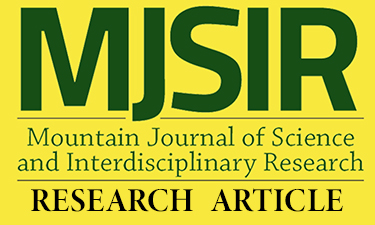Climate Change Experiences and the Role of Community Values in Climate Change Adaptation: Focus on Women Farmers of Sitio Legleg, Palina, Kibungan, Benguet
Main Article Content
Abstract
Women farmers, especially in developing countries, are often considered as the most vulnerable to the devastating effects of climate change. Using life history approach, this study explored the experiences of women subsistence farmers in Sitio Legleg on climate change within their cultural milieu to be able to identify indicators of climate change and analyzed how community values help the women farmers adapt to climate change. Many of the women farmers experienced hotter climate, less rainfall, and dwindling water supply. Cough, colds, chicken pox, sore eyes, and amoebiasis became common ailments. They likewise experienced a widespread wilting of their main crop, sweetpotato. Nonetheless, certain community values such as gender division of labor, reciprocity and 'alluyon' helped them adapt to the potentially devastating impacts of climate change by allowing women, men and community members to share the burden of providing for the family.
Article Details
References
Batani, R.S. (2012). Time use study: exploring the linkages between well being and climate change, a case study of farming communities in northern philippines. BSU Research Journal, 67b, 27.
Batani R.S., Napaldet J.T., Camfili M.M., Gapasin, M.D. & Ngina K.C. (2013). Negotiating climate change: vulnerabilities and resilience of four Benguet communities. BSU Research Journal, 69, 25-26.
Bhatt, V., Abeka, S., Anwer, S., Bii, S., Muasya, B.P., Rozario, A.R., Valverde, G., & Vilchez, O.A.V. (2012). Women Farmers Adapting to Climate Change. Diakonisches Werk der EKD e.V. for “Brot für die Welt“ and Diakonie Katastrophenhilfe Stafflenbergstraße 76
D-70184 Stuttgart. Retrieved from http:// www.brot-fuer-diewelt.de/fileadmin/mediapool /2_Downloads/Fachinformationen/Dialog/ dialog09_women-farmers.pdf. on November 2015
FAO Corporate Document Repository. (1998). Gender and Food Security. Retrieved on from http://www.fao.org/docrep/x0198e/x0198e02. htm on November 2015
Gaye, I. (2009). Gender and Climate Change: Women Matter. Economic Commission for Africa. Retrieved from http://www.fanrpan.org/ documents/d01004/ADFVII-gender_and_ climatechange.pdf on November 2015
Morton, J.F. (2007). The Impact of Climate Change on Smallholder and Subsistence Agriculture. Retrieved from from https://www.ncbi.nlm.nih. gov/pubmed/18077400 on August 2017
Parao, M.R., Pablo, J.P., Wagan, A.M., Garcia, J.N.M., & Medina, S.M. (2017). Climate change vulnerability assessment in selected highland areas of Benguet: an application of VAST-Agro tool. Mountain Journal of Science and Interdisciplinary Research. 77, 01-15.
Sauliere, S. (2011). Climate Change and Women Farmers in Burkina Faso: Impact and Adaptation Policies and Practices. Oxfam Research Reports. Retrieved from https://www.oxfam.org/sites/ www.oxfam.org/files/rr-climate-change-womenfarmers-burkina-
130711-en.pdf on November 2015
Thorlakson, H. & Neufedlt, H. (2012). Reducing Subsistence Farmers’ Vulnerability to Climate Change: Evaluating the Potential Contributions of Agroforestry in Western Kenya. Retrieved from https://doi.org/10.1186/2048-7010-1-15 on August 2017
United Nations Environment Program (UNEP) Year Book. (2009). Climate Change. Retrieved from http://www.unep.org/yearbook/2009/PDF/ 3-Climate_Change_%20UNEP_YearBook_09_ low.pdf on November 2015
UN Women Watch. (2009). Women, Gender Equality and Climate Change. Retrieved from http://www. un.org/womenwatch/feature/climate_change/On November 2015

